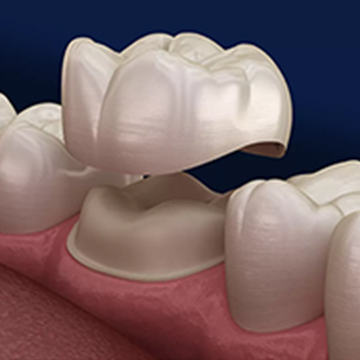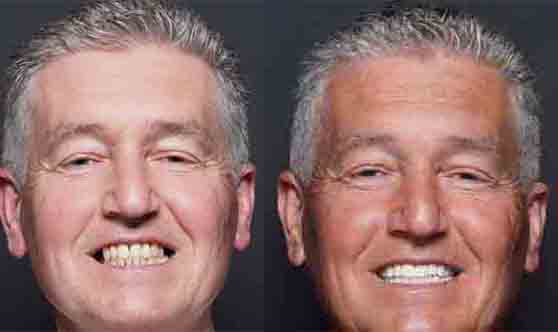Dental Crowns
Get a QuoteBy Emel Gerdaneri • Medical review by Baris Unlu, DMD on September 11, 2023
Get a Quote
Quick Facts

It is the result of a dental crown performed by Baron Dental Clinic. For reference purposes only, results may vary.
Dental Crowns Before & After PhotosDoctors
Most Active Doctors on NewMe
Real Reviews
Most Related Review
All About Dental Crowns
What is Dental Crowns ?
Dental crowns are caps that are placed on damaged teeth. Crowns are used to protect teeth and moreover restore the shape of teeth when dental fillings do not solve the current problem. Dental crowns can be made of metal, porcelain zirconium and ceramic materials. In addition, when oral hygiene is provided, they do not require special care over time.
Problems such as tooth decay and wear that may occur in the teeth over time can cause problems in the shape or size of the teeth. Dental crowns act as a hat on the tooth, which can eliminate these problems. The dental crown is attached to your tooth and covers the visible part of the tooth. In this way, it restores the shape, size, strength and appearance of the tooth.
Who Can Get Dental Crowns?
You may need a dental crown for different reasons. Those with the following problems may have dental crown treatment:
• Protecting a weakened but not yet decayed tooth with cracks
• Restoring a broken tooth or a severely worn tooth
• To cover and support teeth in individuals with large fillings and no longer teeth
• Keeping the dental bridge in place.
• Treating misshapen or severely discolored teeth
• Covering the dental implant
• To cover a tooth that has had root canal treatment.
What are the Types of Dental Crowns?
Permanent crowns can be made from many different materials.
All-Ceramic Crowns: All-ceramic crowns are a popular alternative for patients who want their most naturally treated teeth to match their existing teeth. All porcelain crowns can be precisely colored to match the patient's teeth. All-ceramic crowns are made of 100% ceramic, which makes the crown more transparent, transmitting light, and providing a natural, shiny appearance.
Zirconia Crowns: Zirconia crowns are durable, strong and long lasting. Zirconia itself is a type of white ceramic and is considered the strongest material used in dentistry. Because it is a hard material, zirconia teeth must be processed with computer systems such as CAD, which is a computer-aided design, or computer-aided manufacturing CAM. Zirconia crowns can also be coated with porcelain to achieve the final color and shape of the tooth. Many dentists and patients prefer zirconia crowns for their durability. In addition, zirconia is extremely well tolerated by the human body.
Ceramic-Metal Crowns: Ceramic-metal crowns are made from a metal substructure coated with a ceramic layer. It is such a hybrid material and can also provide a strong, durable solution and natural-looking results. Although ceramic-metal crowns have declined in recent years, they are still widely used due to their durability.
How is Dental Crown Treatment Performed?
First Visit
In the first visit, the tooth to be crowned is examined and prepared. An X-ray of the tooth and surrounding bone is taken. If any problems such as tooth decay, infection, injury to the pulp of the tooth are noticed in your teeth, your dentist may have to perform a root canal treatment before your dental crown procedure.
The tooth to be treated with the crown is filed from the top and the sides, thus making room for the crown coating. How much to file depends on the type of crown planned. If a large portion of your tooth is missing due to damage or decay, a filling material may be used to create enough tooth structure to cover the crown.
After reshaping the tooth, the size of the tooth to be crowned is taken with the help of a paste and sent to a dental laboratory. The lab will make the crowns and send them back to your dentist, usually within two to three weeks. At this first visit, you will be given a temporary crown until your permanent crowns arrive.
Second Visit
At your second visit, the temporary crown is removed and the permanent crown is placed on your tooth. The fit and color of the permanent crown is checked. If all is well, your new crown teeth are permanently attached to their place under local anesthesia.
Same Day Dental Veneers
If your dentist has the equipment, dental crowns can also be made in the dentist's office without being sent to the lab. This process works the same way. Thanks to the computer software used, a 3D model of the tooth is created. The digital design is then sent to another in-office machine. This method of making crowns is called computer aided design/computer aided manufacturing (CAD/CAM). In less than 15 minutes, the crown is ready to be bonded in place.
What are the Risks of Dental Crowns?
There are several problems you may encounter over time with dental crowns:
-
A newly coated tooth may cause pain when the anesthetic begins to lose its effect immediately after the procedure. If there is still a nerve inside the veneer, you may experience some sensitivity to heat and cold. Your dentist may recommend brushing your teeth with toothpaste designed for sensitive teeth. Pain or tenderness when you bite usually means that the crown is too high on the tooth. In this case, call your dentist. This problem is easily fixed.
-
Crowns made entirely of porcelain can sometimes break.
-
Sometimes, the material holding the crown can flow out from under the crown. This not only allows the crown to loosen, but also causes bacteria to seep in and decay the remaining tooth.
-
The dental crown may fall off. This is usually due to incompatibility and not being well placed.
-
The metals used to make dental crowns are usually a mixture of several metals. You may have an allergic reaction to the metal or porcelain used in the dental veneer. However, this is extremely rare.
-
A dark line may occur next to the gum line in the coated tooth. This is normal, especially if you have a porcelain veneer fused to metal. This dark line can be seen through the crown.
How Long Do Dental Crowns Last?
On average, dental crowns last between five and 15 years. It depends on the amount of “wear and tear” that the crown is exposed to, how well you follow oral hygiene practices.
Does a Crowned Tooth Require Any Special Care?
The crowned tooth does not need any special care. However, the underlying tooth still needs to be protected from decay or gum disease. Therefore, you should continue to follow your oral hygiene practitioners. Also, avoid biting hard surfaces with porcelain crowns to prevent the porcelain from cracking.
How Much Do Dental Crowns Cost?
The cost of dental crowns can vary depending on where you live and the type of crown you choose. For example, porcelain crowns are typically more expensive than porcelain fused metal crowns. In general, the cost of dental crowns can range from $800 to $1,500 per crown.
Written on 07/03/2023
-
Last Update: 02/11/2023

 Ask a Doctor
Ask a Doctor







